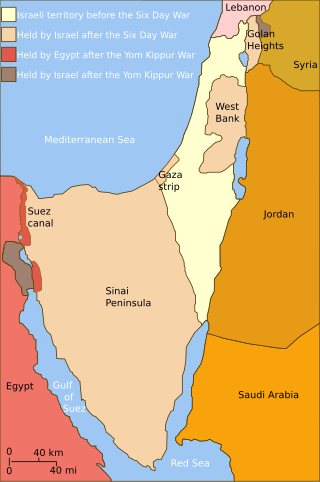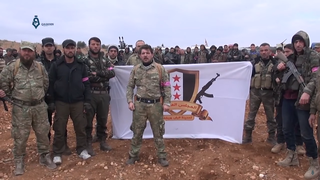
A ceasefire, also spelled cease-fire, is a stoppage of a war in which each side agrees with the other to suspend aggressive actions often due to mediation by a third party. Ceasefires may be between state actors or involve non-state actors.

United Nations Security Council Resolution 338 was a three-line resolution adopted by the UN Security Council on 22 October 1973, which called for a ceasefire in the Yom Kippur War in accordance with a joint proposal by the United States and the Soviet Union. It was passed at the 1747th Security Council meeting by 14 votes to none, with China abstaining.
This is a broad timeline of the course of major events of the Syrian civil war. It only includes major territorial changes and attacks and does not include every event.
The Syrian peace process is the ensemble of initiatives and plans to resolve the Syrian civil war, which began in 2011 and spilled beyond its borders. The peace process was moderated by the Arab League, the UN Special Envoy on Syria, Russia and Western powers. The negotiating parties were representatives of the Syrian Ba'athist regime and the Syrian opposition. The Autonomous Administration of North and East Syria was excluded at the insistence of Turkey. Radical Salafist forces including the Islamic State of Iraq and the Levant have not engaged in any contacts on peaceful resolution to the conflict.

The Democratic Union Party is a Kurdish left-wing political party established on 20 September 2003 in northern Syria. It is a founding member of the National Coordination Body for Democratic Change. It is the leading political party among Syrian Kurds. The PYD was established as a Syrian branch of the Kurdistan Workers Party (PKK) in 2003, and both organizations are still closely affiliated through the Kurdistan Communities Union (KCK).
The U.S.–Russia peace proposals on Syria refers to several American–Russian initiatives, including joint United States–Russia proposal issued in May 2013 to organize a conference for obtaining a political solution to the Syrian Civil War. The conference was eventually mediated by Lakhdar Brahimi, the United Nations peace envoy for Syria.

Turkey's involvement in the Syrian civil war began diplomatically and later escalated militarily. Initially, Turkey condemned the Syrian government at the outbreak of civil unrest in Syria during the spring of 2011; the Turkish government's involvement gradually evolved into military assistance for the Free Syrian Army in July 2011, border clashes in 2012, and direct military interventions in 2016–17, in 2018, in 2019, 2020, and in 2022. The military operations have resulted in the Turkish occupation of northern Syria since August 2016.
Hêvî Îbrahîm Mustefa, is the Democratic Union Party (PYD) prime minister of the Afrin Region, a de facto autonomous region of the Democratic Federation of North and East Syria.

AANES–Ba'athist Syria relations concern the military and political relations between the Ba'athist Syrian Arab Republic and the Autonomous Administration of North and East Syria (AANES), a de facto autonomous multi-ethnic region in northern and eastern Syria. The Syrian Ba'athist government did not officially recognise the autonomy of the AANES, and advocated a centralist approach to the governance of Syria. The NES seeks the federalisation of Syria. For most of the Syrian civil war, there was a non-aggression pact between the military of Syria and the Syrian Democratic Forces, with occasional confrontations and some cooperation against Islamist groups, in particular against the Turkish Armed Forces and the Turkish-backed Syrian National Army. While the two sides co-operated militarily under Russian supervision since 2019, with Syrian and Russian troops stationed along the Turkish border to prevent further advances, political negotiations ended in failure. The Assad regime had no authority or institutions in North and East Syria outside of its two security boxes in Qamishli/Qamislo and Al-Hasakah/Heseke. The Autonomous Administration did not allow the Syrian Government to hold elections in areas under its control.

The United Nations Security Council Resolution 2254 was unanimously adopted on 18 December 2015. It called for a ceasefire and political settlement in Syria as a means to end the civil war. The document described the roadmap for Syria's political transition.
The Geneva peace talks on Syria, also known as Geneva III, were intended peace negotiations between the Syrian government and opposition in Geneva under the auspices of the UN. Although formally started on 1 February 2016, they were formally suspended only two days later, on 3 February 2016.
The Syrian protests (2016) were a series of large-scale protests against the Syrian government and in support of the Syrian opposition taking place throughout opposition-controlled territory in Syria. The protests spread throughout the country due to the implementation of a partial ceasefire taking place after 27 February 2016. The goal of the protests in 2016 was the resignation of president Bashar al-Assad. In addition, the activists demanded the withdrawal of Russian forces from Syria, displaced people to be returned to their homes and adequate humanitarian aid.
Several attempts have been made to broker ceasefires in the Syrian Civil War.

The Turkish Armed Forces and its ally the Syrian National Army have occupied areas of northern Syria since August 2016, during the Syrian civil war. Though these areas nominally acknowledge a government affiliated with the Syrian opposition, in practice they constitute a separate proto-state under the dual authority of decentralized native local councils and Turkish military administration.
The following is a timeline of the Syrian Civil War from January to April 2018. Information about aggregated casualty counts is found at Casualties of the Syrian Civil War.

Operation Olive Branch was an invasion by the Turkish Armed Forces and Syrian National Army (SNA) in the Kurdish-majority Afrin District of northwest Syria, against the People's Protection Units (YPG) of the Syrian Democratic Forces (SDF). The air war and use of major artillery ended as the Arab and Turkmen militias of the SNA entered the city of Afrin on 18 March 2018.
A global ceasefire is a temporary stoppage of war on a planetary scale, i.e., by every country. A global ceasefire was first proposed by United Nations Secretary-General António Guterres on Monday, 23 March 2020, as part of the United Nations' response to the COVID-19 pandemic. On 24 June 2020, 170 UN Member States and Observers signed a non-binding statement in support of the Appeal, and on 1 July 2020, the UN Security Council passed a resolution demanding a general and immediate cessation of hostilities for at least 90 days and requesting that the UN Secretary-General accelerate the international response to the coronavirus pandemic.

United Nations Security Council resolutions are United Nations resolutions adopted by the fifteen members of the Security Council (UNSC); the United Nations (UN) body charged with "primary responsibility for the maintenance of international peace and security".
The Israel–Hamas war sparked a major diplomatic crisis, with many countries around the world reacting strongly to the conflict that affected the momentum of regional relations. At least nine countries took the drastic step of recalling their ambassadors or cutting diplomatic ties with Israel. The conflict has also resulted in a renewed focus on a two-state solution to the ongoing conflict.









